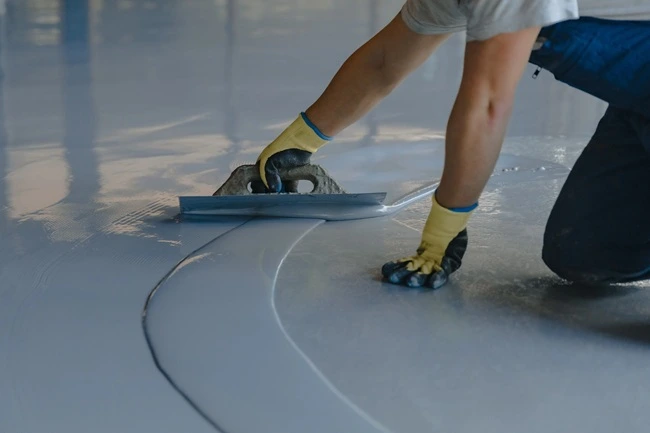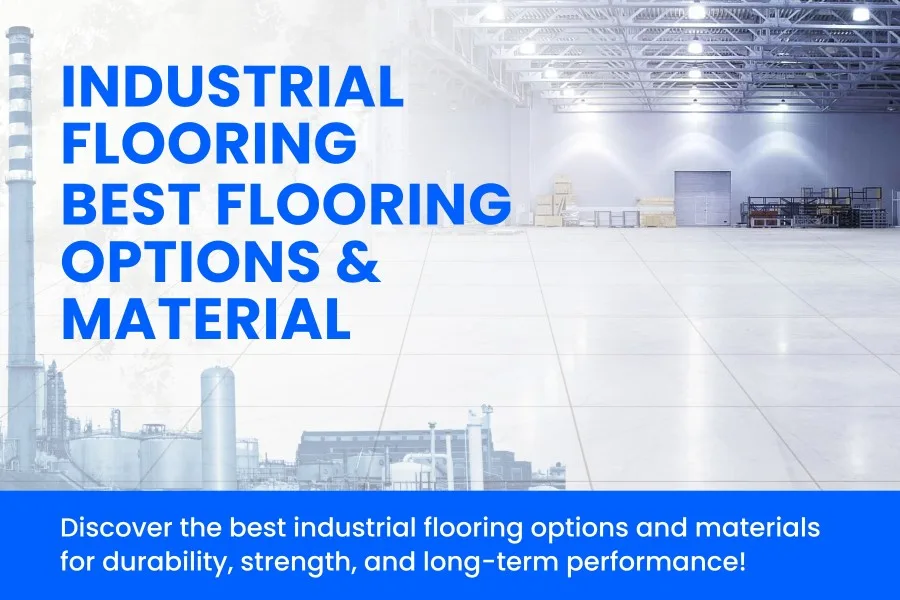In an industrial context, the floor is much more than a walking surface. It is an important contributor to safety, durability, and efficiency in a space.
The industrial floor must endure both heavy loads of machinery and foot traffic, spills of chemicals, and high and low temperatures while presenting a safe and non-slip surface. It is imperative to choose the correct flooring for the longevity and efficiency of any industrial space.
Table of Contents
In this blog, we will look at the best industrial flooring options and materials so you have the information to make an educated decision for your industrial facility. We will also discuss the role of floor hardener in increasing durability in industrial flooring.
Factors to Consider When Choosing Industrial Flooring
Here are some crucial aspects to keep in mind:
Durability – Industrial environments often expose flooring to extreme conditions, including operations involving heavy equipment or forklifts, and daily movement of goods and employees. A flooring solution should be durable enough to withstand high loads without cracking, chipping, or wearing down easily.
Chemical Resistance – Many manufacturing and pharmaceutical sectors use harsh chemicals, oils, solvents, and acids; therefore, industrial flooring must be resistant to chemical spills that may cause deterioration, staining or weaken the material.
Slip Resistance – While workplace safety is always a priority, flooring can also be a major factor in reducing slips, trips, and falls. Slip-resistant flooring is important and especially so in industrial settings, where liquids, oils, or water may spill onto the flooring surface.
Maintenance – Ease of cleaning and maintaining the industrial flooring is another important factor. Some flooring options may require frequent waxing, sealing, or refinishing resulting in higher costs over the life of the flooring.
Installation Time – Installation time is another important factor as downtime can be costly in industrial settings. Some flooring options such as vinyl tiles or interlocking rubber mats may be installed faster than alternatives such as epoxy or concrete flooring, which may require longer curing times.
Cost-Effectiveness – Although upfront costs are critical, it is also important to consider long-term costs of repairs, maintenance, and replacements. High-quality industrial hard floor coverings can certainly have higher upfront costs; however, the upfront investment can result in long-term savingsnot just in wear and repairs, but in maintenance costs in the future as well.
Aesthetic Appeal – While industrial flooring is primarily selected for function, the aesthetics can be important when clients and visitors access the areas in a commercial space. Polished floors, clean and shiny, add professionalism and cleanliness to the appearance of a space, leading to a better atmosphere in the workplace.
Temperature and Environmentally Sensitive to its Resistance – Industrial spaces can be very cold in frozen storage rooms or extremely hot in manufacturing processes. Flooring must accommodate extremes in temperatures without cracking, expanding, or breaking down.
Noise and Vibration resistance – Similar to temperature and environmental considerations, equipment and processes can cause excessive noise and vibration in certain industrial spaces, such as manufacturing, automotive, and any assembly spaces.
Compliance with Industry Standards – Various flooring codes and standards influence the flooring choices for specific workplaces. For example, flooring in food processing plans should be hygienic and non-porous. In laboratories, static-resistance flooring should be used for the obvious electrical dangers from static.
Now let’s review the best options for industrial flooring.

1. Epoxy Flooring
Best for: Warehousing, manufacturing facilities, pharmaceutical facilities, food processing and similar work Epoxy flooring is one of the more commonly used options for an industrial floor due to its strength, chemical resistant surface, and seamless nature. Epoxy flooring is a mixture of a resin and a hardening agent, which cures to a hard, plastic-like surface.
Pros:
Highly resistant to chemicals and abrasions
Easily cleaned and maintained
Looks glossy and professional
Reflects light well, so it can reduce energy costs
Can be placed over existing concrete floors to provide additional strength
Cons:
Requires a professional to install
May be slippery when wet unless you add a slip-resistant compound
May crack or chip under heavy impact / force
May take 1 – 3 days to cure before use
Epoxy flooring is a great option for those types of facilities and for companies that are looking for a strong, finished look that is durable enough for an industrial setting.
2. Concrete Flooring with Floor Hardener
Ideal for: Heavy manufacturing, warehouses, and logistic centers. Concrete is a tried and true industrial flooring materials because of its strength and cost of ownership.
But a floor hardener can significantly enhance the durability of the concrete floor. By increasing surface density, concrete floor hardens offer improved wear resistance, stain resistance and moisture penetration.
Pros:
Durable and long lasting.
Able to withstand heavy machinery and high-impact.
Lower maintenance and cost of ownership.
Coatings and sealants can be added for greater protection.
Higher compressive strength leads to less surface damage.
Can be polished to achieve a smooth finish.
Cons:
Concrete will crack over time if not maintained.
Unless sealed, dust can be problematic.
Concrete can be hard and cold with have.
May need further treatment to increase slip-resistance.
Concrete flooring, when apply with a floor hardener, renders itself to be more resilient and durable in areas of heavy mechanical stress which is a desirable characteristic for industries performing heavy-duty operations.
3. Polyurethane Flooring
Best for: Food services, pharma, and extreme temperature rooms.
Polyurethane (PU) flooring is well known for its flexibility and again is an outstanding flooring option for areas with temperature variations. PU flooring is also extremely resistant to chemical and wear.
Pros:
Superior durability and resilient to chemicals.
Excellent in high temperature.
More elastic than epoxy.
Produces a smooth, seamless surface.
Improved resistance to UV exposure and subsequent yellowing of surfaces.
Withstands thermal shocks, making it a wise choice for coolers and freezer applications.
Cons:
More expensive than epoxy flooring.
Requires professional installation.
Needs surface preparation to ensure proper adhesion.
Polyurethane flooring is an option worthy of consideration in those facilities that require a high degree of hygienic performance, such as hospitals and food processing environments.
4. Vinyl Flooring
Best for: Health-care facilities, labs, and some light industrial applications. Vinyl flooring is an effective option for industries that require a clean and hygienic environment. They come in either sheets, tile, or planks.
Pros:
Water and stain-resistant.
Comfortable underfoot.
Quiet in busy environments.
Easy to install and replace.
Comes in numerous colors and patterns.
Lasts well when in bacterial growth areas, such as health-care facilities.
Cons:
Not always as durable as epoxy or concrete.
Can wear out in high-traffic areas.
Can scratch or dent with use.
May need other underlayment to make the surface more durable.
5. Rubber Flooring
Best for: Automotive workshops, gyms, and labs. Rubber flooring is durable and slip resistant and provides a very good surface for support, cushioning, and shock absorption.
Pros:
Excellent slip resistance.
Absorbs sound and vibrations.
Comfortable for long hour use.
Resistant to water and chemicals.
Can reduce fatigue in workers standing for extended periods of time.
Comes in modular formats to replace worn areas more easily.
Cons:
Can be cost-prohibitive.
Not designed for very heavy loads.
Regular maintenance is required to avoid degradation.
Importance of Floor Hardener in Industrial Flooring
A floor hardener is a material applied to concrete surfaces which increases durability and resistance to wear and tear. It is an important part of industrial flooring to increase the longevity of the flooring and reduce maintenance costs.
Types of Floor Hardeners:
Metallic Floor Hardeners – for extremely heavy loads areas.


Non-Metallic Floor Hardeners – for general industrial environments.


Liquid Densifiers – these penetrate concrete and create a denser and more durable surface.
Advantages of Floor Hardener:
Increased abrasion and impact resistance.
Reduced dusting and maintenance.
Increased overall strength of the floor.
Increased longevity of concrete flooring.
Increased resistance to staining and moisture.
Conclusion
Selecting the appropriate industrial flooring is an important undertaking that can heavily influence the effectiveness and safety of an industrial space.
Regardless if you choose to install either an epoxy, polyurethane, vinyl, rubber, interlocking tile or concrete flooring with a floor hardener. You will need to consider factors such as the value for your money, durability, and maintenance level.
If you need it to be in a high-impact area, the best option could be concrete flooring with a floor hardener. If instead, you need chemical resistance and a more aesthetically pleasing option, it could potentially be epoxy or polyurethane flooring.
If the choice is correct, the flooring will last and translate into cost-effective maintenance and safety for the industrial space.
FAQS
Which industrial flooring type is the hardest?
A floor hardener can be applied to concrete and is generally one of the hardest industrial flooring types available.
How do I properly care for my epoxy flooring?
The key to caring for epoxy flooring is to keep it clean, mild detergent can be used to clean the floor, also avoid applying excessive force and periodically changing the coating, so that longevity and durability are maintained.
Is polyurethane flooring better than epoxy flooring?
Polyurethane flooring is flexible and resists temperature variation better, while epoxy has better impact resistance and hardness.
Can you customize industrial flooring?
Yes, you can customize various types of commercial flooring, such as epoxy and concrete, along with many details like colors, design patterns, and non-slip additives.
How long does the industrial flooring last?
It can be a variety of materials that change the longevity, but with care and maintenance industrial flooring can last 10-30 years, or longer.
With the choice of flooring, and floor hardener, you can create a safe and long lasting industrial work space!
Sagar Telrandhe is a Construction Engineer with a B.Tech in Construction Engineering & Management. Passionate about infrastructure development, project planning, and sustainable construction, he specializes in modern construction techniques, project execution, and quality management, contributing to efficient and innovative building.

